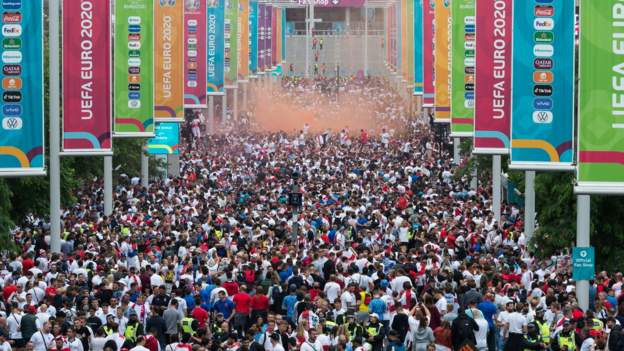
Fans attending sports venues with capacities of about 20,000 or more may be required to show proof of full vaccination from the end of September, under plans being considered by the government.
The BBC understands the definition of what constitutes a large crowd and what type of venues would fall under this label is yet to be determined.
Indoor venues are expected to be treated differently to outdoor ones, and sports organisations are known to be seeking clarity on the matter.
The Racecourse Association (RCA), for example, said it would be speaking to the government and industry stakeholders "to understand the detail behind this plan", and said it would be a "significant logistical operation".
The RCA added: "It is vital that horse racing and the wider sports/leisure economies have contingency plans to avoid commercially damaging restrictions being re-imposed but equally allow us to host safe events".
The UK government allowed the crowd capacity at Wembley to be raised to more than 60,000 for the semi-finals and final of Euro 2020.
Permitted under the government's Events Research Programme, fans attending Wembley were required to follow a number of strict entry requirements, including having a negative Covid-19 test or proof of full vaccination.
Chief scientific adviser Sir Patrick Vallance said on Monday that nightclubs and other such venues could be "potential super-spreading events" because of crowds in close contact.
A capacity crowd of 140,000 attended the British Grand Prix at Silverstone on Sunday - the largest crowd for a sporting event in the UK since the start of the coronavirus pandemic.
There, all adults had to provide proof of full vaccination or be in possession of a negative test.
In Scotland, Rangers have been given permission to have 17,000 fans present at their Scottish Premiership opener against Livingston on 31 July.















 Phone: (800) 737. 6040
Phone: (800) 737. 6040 Fax: (800) 825 5558
Fax: (800) 825 5558 Website:
Website:  Email:
Email: 






